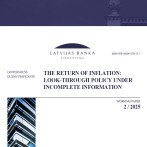Global price pressure on inflation abates, yet prices driven up by tax changes
The pressure of global prices on the prices in Latvia has slightly abated, with the stabilization reflected in both fuel and food price indicators. The appreciating of global energy resources at the beginning of this year will continue to affect the developments regarding the prices of natural gas and thus also heating energy in Latvia. This pressure, however, will abate at the beginning of next year. As a reflection of the above developments, the annual inflation in June dropped slightly while retaining the relatively high 4.8% level. It was supported both by tax changes this year and the previously high rises in the global energy and food prices.
Over a month, the consumer price index grew 0.3%, with the rises in taxes and prices of heating energy as the principal contributors. Higher excise tax rates came into effect for alcohol and fuel. The fuel price rises caused by the higher tax rate were reduced by the dropping global oil prices. The heating tariffs have risen with the natural gas sales prices keeping up with the oil price rises at the beginning of the year. Food prices went down for the first time in ten months (-0.2%). The drop was accounted for both by seasonal factors and dropping vegetable prices as the consumption of greens went down in relation to bacteria-carried infection abroad.
Despite some signs of stabilization, however, price development is still not free from important uncertainties. At the latest meeting of OPEC member countries, they failed to come to the expected agreement on increasing production quotas. That brought to a halt the oil price drop that had begun in May. At the moment, oil prices continue to fluctuate between 105 and 120 US dollars per barrel. The UN Food and Agriculture Organization food price index published yesterday also indicates that food prices continued to be stable and high. Even though pronounced global stability has been observed in the prices of grain, milk, and meat, much uncertainty remains regarding the development of food prices in the future. That will be determined both by the growth of developing countries, particularly China, which is already showing signs of slowing down and by weather conditions that will affect future harvests. The rise in the consumer price level is also expected to abate in July as well. Yet until the end of the year any substantial drops in inflation will be prevented particularly by the raised tax rates on natural gas. A more pronounced drop in inflation is expected next year.
A cause for some worry is the fact that, the low demand notwithstanding, businesses have chosen to transfer a great part of the increased costs resulting from the recent global price changes onto the consumer. That could indicate a relatively low level of competition in Latvia, particularly those segments of the market where average prices remain higher than in the other two Baltic countries. Such developments may support a careful examination of the situation in the area of competition and search for adequate solutions to increase competitiveness in some segments of the market.
Textual error
«… …»






